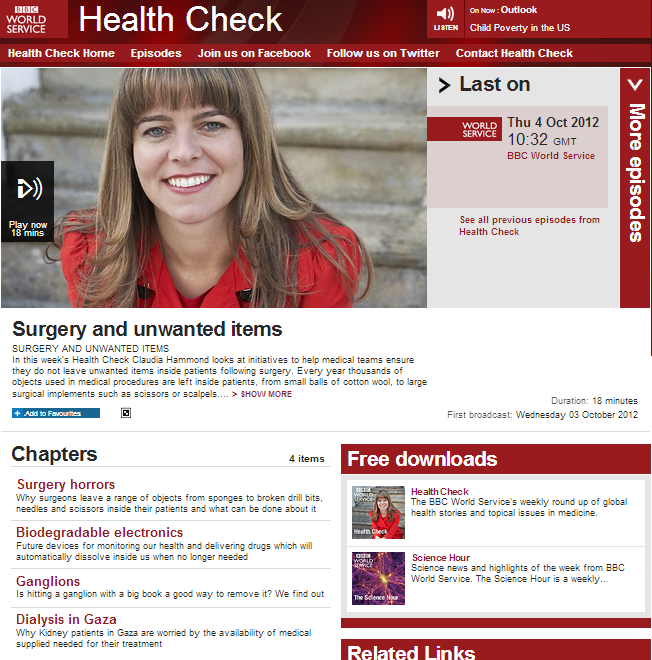If ever there was an example of the patience and tenacity required to see a complaint to the BBC pursued to its logical conclusion, it has to be the following one.
Back in July 2013 we noted here that the BBC’s Editorial Complaints Unit partially upheld a complaint made by Mr Stephen Franklin regarding an edition of the BBC World Service programme ‘Health Check’ dating from October 4th 2012.
Despite the ECU ruling that the impression given in the programme that the entry of medical supplies and equipment to the Gaza Strip had been blocked by Israeli authorities was inaccurate and misleading, the programme concerned remained available for public listening on the internet with no attached correction.
In September 2013 we noted that – after further correspondence from Mr Franklin – a footnote reading “This item gave the impression that the Israeli blockade covered drugs and disposables. This was not the case in the period under discussion” was added to the programme synopsis on the webpage, but it was only visible to visitors who clicked on the drop-down menu and did not appear at all to audience members who elected to go straight to the specific segment of the programme.
Mr Franklin persevered and appealed to the BBC Trust. On February 4th 2014 the Trust published its findings (page 3 and pages 15 – 26 here).
Inter alia, the Editorial Standards Committee concluded:
“that the wording used in the summary of the ECU finding could be understood to mean that the Israeli blockade had covered drugs and disposables at some period.
that the summary was not duly accurate in this regard and that the wording should be referred back to the ECU with a request that it be amended.
that six months was too long a period to wait for a correction of the item to appear online.
that even though there was an acknowledgement of the ECU’s finding on the Health Check website, it was not sufficiently prominent and it was possible that a listener would hear the item without being aware of the factual error. The correction should also be reflected on all BBC webpages on which the content in question was available.
that by including the statement, “Gaza is closed”, without any challenge or further context, explanation or qualification, the audience would have been left with the impression that because of the blockade, Israel is literally closed to anyone requiring medical treatment.
that listeners would be likely to have drawn an inaccurate conclusion about access in general to Israel for medical treatment.
that there had been a breach of the Accuracy guideline in that the item was not duly accurate in how it reflected the complex issue of access to Israel for medical treatment.
that there had been a breach of the Impartiality guideline on this occasion because, in the absence of any challenge, context or alternative view, the opinion of the interviewee – that Gaza is closed in respect of access to Israel for medical treatment – had been allowed to stand as fact.
that taken as a whole the item had breached the Impartiality guideline by failing to give due weight to a significant perspective in this controversial issue.”
Whilst the BBC Trust’s findings are of course welcome, regrettably – as of the time of writing – nothing has been done to rectify the issue of insufficient visibility of the correction on the relevant webpage and the programme as it originally stood is still available.
Let’s hope that it doesn’t take another sixteen months to put that right. Otherwise, some people may begin to question the BBC’s level of commitment to correcting its mistakes.
Related Articles:
Listener complaint partially upheld but BBC programme still available
A complaint to the BBC is upheld – and then what?




